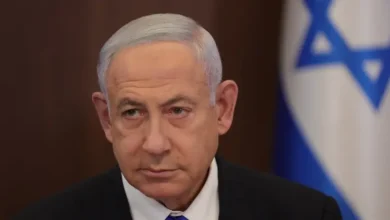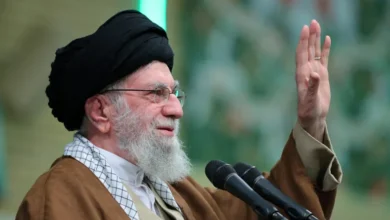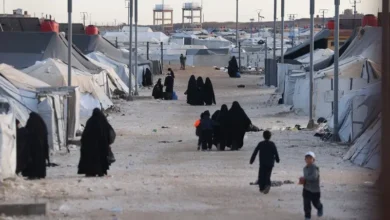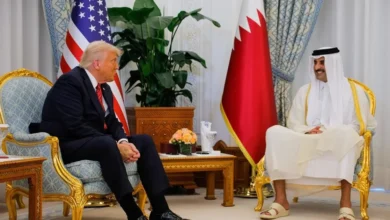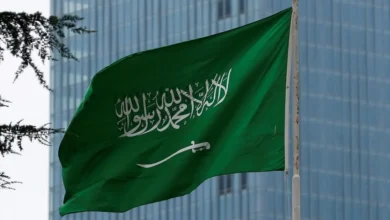Lebanon pins hopes on offshore oil exploration amid economic collapse

In the midst of Lebanon’s most devastating economic crisis in recent history, the arrival of a drilling rig off its coastline last week ignited a glimmer of possibility in a country long accustomed to navigating tumultuous waters. For years, Lebanon has harbored dreams of tapping into its offshore oil and gas reserves, fueled by regional dynamics and a desire to diversify a chronically fragile economy.
Last Wednesday, a drilling rig reached Lebanon, intending to initiate offshore oil-and-gas exploration later this month, as the French energy group TotalEnergies stated.
The commencement of offshore drilling activities in Lebanon comes after a significant agreement facilitated by the United States last year. This historic agreement established a maritime boundary between the waters of Lebanon and Israel, marking the first time such a distinction has been set.
TotalEnergies spearheads a consortium for the offshore venture, identified as Block 9, which comprises the participation of Italian oil group ENI and state-owned QatarEnergy.
How much gas or oil Block 9 holds – if any at all – is still unclear.
Lebanon’s interest in offshore exploration took root in the early 2000s as the country embarked on the journey of uncovering its hydrocarbon potential. Nestled between oil-rich neighbors, the allure of delving into offshore oil-and-gas discoveries captivated Lebanon’s aspirations, holding the prospect of attaining economic self-sufficiency and liberation from the shackles of external pressures.
However, the complex geological conditions, deep water depths, technical challenges and the relatively small size of Lebanon’s potential reserves presented multiple obstacles to development.
The country’s efforts to develop its oil-and-gas sector were also influenced by domestic political challenges, including governance issues, administrative delays, institutional weaknesses and corruption. These hurdles impacted the ability to attract investments and develop a robust regulatory framework for the industry.
Further adding to the complexity of the endeavor were the intricate geopolitics of the region. Lebanon’s offshore discovery has been entangled in disputes over maritime borders with neighboring countries, stirring diplomatic tensions that could spark instability.

Today, Lebanon stands at the precipice of a financial abyss. The currency’s steep fall, depletion of foreign reserves and the haunting cadence of rolling blackouts have plunged the nation into dire straits. Lebanon views its potential oil-and-gas resources as an opportunity to address its economic problems, including high debt and unemployment rates. The government hopes that revenue generated from the hydrocarbon sector will boost the economy and improve infrastructure.
Tempering expectations
In light of the intricacies involved, Marc Ayoub, an energy policy expert at the Tahrir Institute for Middle East Policy, a Washington-based think tank, underscored the crucial necessity of managing expectations and gleaning valuable lessons from history.
“In 2013, Lebanon set in motion its inaugural offshore licensing round to auction exploration and production rights within its Exclusive Economic Zone. The process, albeit promising, was marred by political and administrative setbacks, leading to substantial delays and a subsequent hold on contract awards.” Ayoub told Al Arabiya English.
“The atmosphere at the time was infused with an almost euphoric belief in Lebanon’s emergence as an oil-rich nation, sparking a surge of enthusiasm that even spurred some to pursue oil-related academic disciplines. However, the momentum was quickly dampened as political barriers persisted and regional peers such as Israel and Cyprus surged ahead in their endeavor to harness energy resources,” Ayoub added.
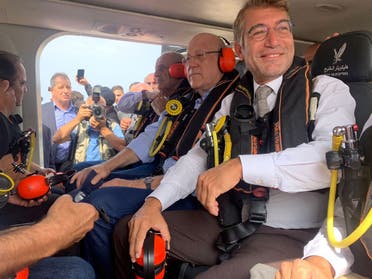
While the temptation to dwell on potential pitfalls still persists, Ayoub maintains that a balanced perspective is essential. He emphasizes that amidst the cautious stance, developments should be viewed positively, with a watchful eye on practicality.
“Even if discoveries materialize, the transformation from potential reserves to productive wells takes a significant period — around four to five years,” he explained. “This temporal lag signifies that Lebanon’s ongoing financial crisis cannot be deferred for another half-decade, hinging on the oil-and-gas sector as a panacea.”
Ayoub drives home the fact that while revenues from oil and gas hold the promise of substantial influxes, they are not an all-encompassing solution.
“These revenues alone are insufficient to bridge Lebanon’s current financial chasms,” he noted. “Consequently, anchoring the nation’s future solely on the hydrocarbon sector would be unwise. Instead, we need a comprehensive approach rooted in macroeconomic reforms, restructuring of the banking system and a holistic transformation of fiscal policies.”
This should see oil and gas as supplementary contributors, he suggested.
Charting a course of Lebanon’s future
Navigating the complexities that lie ahead demands a comprehensive strategy.
In a recent development, the Budget and Finance parliamentary committee unveiled the formulation of a draft law for the creation of a Sovereign Wealth Fund (SWF) tasked with overseeing oil-and-gas revenues. This follows seven months of deliberations in the Parliament. Yet, questions linger about the ideal timing for its establishment.
Laury Haytayan, a Lebanese oil-and-gas expert, explained to Al Arabiya English that although the law, which was ratified in 2010, stipulated that all oil-and-gas sector revenues must eventually funnel into an SWF, it remained silent on the timeline for its establishment.
“With just one active block undergoing hydrocarbon activities, the creation of the fund is tethered to its outcomes,” Haytayan said. “There’s a necessity to await Block 9’s results and TotalEnergies’ decision on gas viability, as the SWF’s functionality and appointment of personnel depend on concrete revenue streams.”
She underscored that though the SWF was meant to ensure transparency and prudent fund management, the country’s precarious conditions had consistently challenged the effectiveness of laws in guaranteeing these ideals.
“While the legal mandate exists, the timing for SWF’s implementation should align with imminent production and revenue inflow from the sector,” she added.
Commenting on ensuring a responsible and sustainable approach to offshore exploration, Haytayan stressed that a recalibration of the government’s energy strategy was imperative, especially considering all the changes that have transpired within the country over the years.
As the nation deals with an economic and institutional breakdown, a silver lining emerges on the energy front, driven by necessity.
“Citizens with the financial means are embracing renewable energy, exemplified by the growing adoption of solar power for electricity generation,” Haytayan said. “These grassroots initiatives, born of the government’s failure to provide electricity, present an avenue for expanding renewable energy capacity.”
With this trend in mind, she suggested that directing investments towards renewables might outweigh gas pursuits.
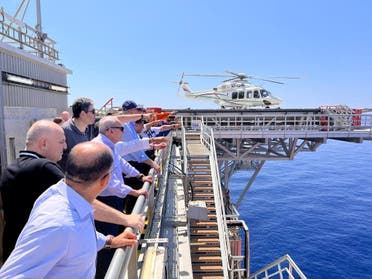
Balancing the ledger of blessing and curse
In the challenging journey of harnessing its oil-and-gas resources, Lebanon stands at a crossroads where the specter of the resource curse looms large. Drawing from poignant examples worldwide, such as Nigeria and Angola, countries that have grappled with mismanagement of their oil wealth, Lebanon must remain vigilant.
“Despite Nigeria’s considerable oil revenues, it wrestles with corruption, political instability and poor governance,” Ayoub noted. “Similarly, Angola, rich in oil, has been beset by issues like misconduct and opacity, with a significant portion of its population mired in poverty despite abundant oil earnings.”
He mentioned that Lebanon must internalize these lessons as it chalks out its future course.

“A resilient governance framework emphasizing transparency, accountability and prudent management is paramount to sidestepping the resource curse’s treacherous grip.”
In the same context, Haytayan said: “A visionary perspective is paramount, defining clear goals and aspirations for the oil-and-gas sector and its economic impact,” adding that competent human capital forms the bedrock.
“Capable individuals with the acumen to steer the ship, coupled with an unwavering commitment to transparency and accountability, can elevate the sector’s trajectory.”
However, according to her, transparency and accountability necessitate more than just regulatory provisions. They hinge on a culture of responsibility underpinned by a mentality and the resolve to uphold ethical practices. Lebanon’s existing transparency laws are but a foundation. The country’s collective intent to uphold them is the true cornerstone, she highlighted.
As the nation deals with the question of stewardship, the question of leadership emerges.
“The prevailing political class, tainted by malfeasance and mismanagement, lacks the credentials to effectively oversee any portfolio, let alone the intricate realm of oil and gas,” Haytayan stressed. “Expecting efficient management from those who’ve presided over Lebanon’s fiscal deterioration is unrealistic. Entrusting the oil-and-gas sector to these very hands risks transforming potential blessings into curses, subjecting it to the corrosive grip of corruption.”

